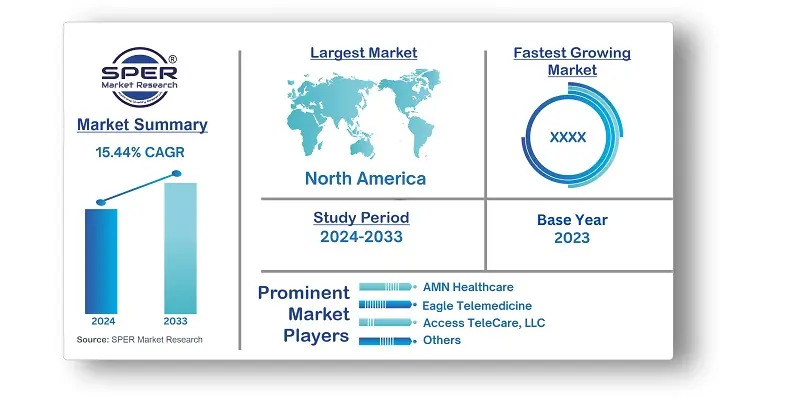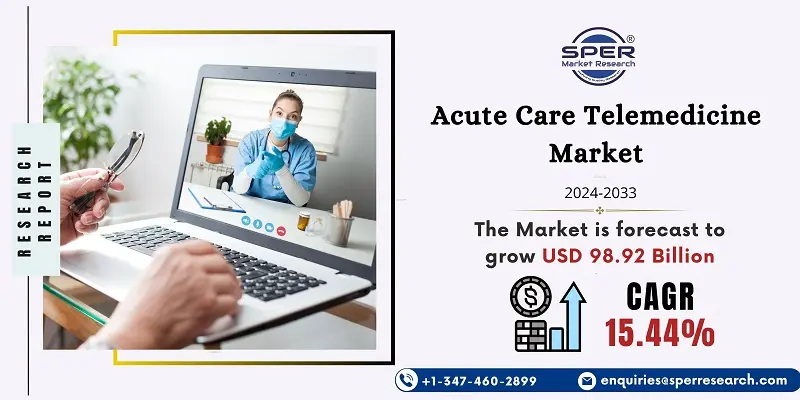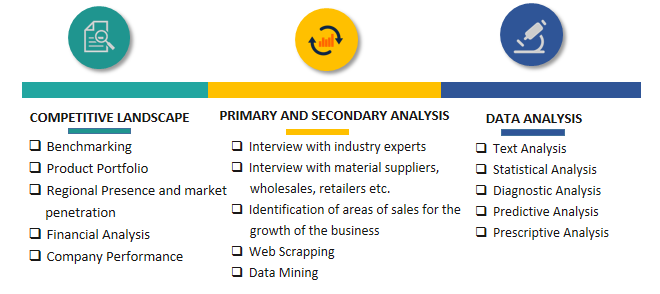
Acute Care Telemedicine Market Trends, Share, Size, Revenue, Demand and Future Outlook
Acute Care Telemedicine Market Growth, Size, Trend Analysis- By Delivery, By Application, By End User- Regional Outlook, Competitive Strategies and Segment Forecast to 2033
| Published: Nov-2024 | Report ID: HLCA2492 | Pages: 1 - 253 | Formats*: |
| Category : Healthcare | |||
- Televate, a teletherapy platform created to expand students' access to therapy services, was unveiled in July 2024 by healthcare solutions firm AMN Healthcare. It makes it possible for school therapists, including psychologists and speech-language pathologists, to hold sessions in virtual therapy rooms.
- Apollo Telehealth opened a telemedicine-enabled primary health center (PHC) in Borobeka, Manipur, in June 2024 in collaboration with the Manipur government. The goal of this project is to improve access to healthcare for those affected by recent disruptions.


| Report Metric | Details |
| Market size available for years | 2020-2033 |
| Base year considered | 2023 |
| Forecast period | 2024-2033 |
| Segments covered | By Delivery, By Application, By End Use |
| Regions covered | North America, Asia-Pacific, Latin America, Middle East & Africa and Europe. |
| Companies Covered | ScienceSoft USA Corporation; AMN Healthcare; Orbit Health GmbH; U.S. Acute Care Solutions, LLC; Access TeleCare, LLC; SynergenX; Eagle Telemedicine; Enghouse Video (Vidyo, Inc.); RelyMD. |
- Healthcare Providers and Hospitals
- Patients Requiring Urgent Care
- Emergency Medical Services (EMS)
- Long-Term Care Facilities and Nursing Homes
- Specialty Healthcare Providers (e.g., Neurologists, Cardiologists)
- Government and Public Health Agencies
| By Delivery: | |
| By Application: | |
| By End Use: |
- Global Acute Care Telemedicine Market Size (FY’2024-FY’2033)
- Overview of Global Acute Care Telemedicine Market
- Segmentation of Global Acute Care Telemedicine Market By Delivery (Clinician-to-Clinician, Clinician-to-Patients)
- Segmentation of Global Acute Care Telemedicine Market By Application (Teleradiology, Telepsychiatry, Tele-ICU, Teleneurology, Telenephrology, Others)
- Segmentation of Global Acute Care Telemedicine Market By End Use (Hospitals and Clinics, Others)
- Statistical Snap of Global Acute Care Telemedicine Market
- Expansion Analysis of Global Acute Care Telemedicine Market
- Problems and Obstacles in Global Acute Care Telemedicine Market
- Competitive Landscape in the Global Acute Care Telemedicine Market
- Impact of COVID-19 and Demonetization on Global Acute Care Telemedicine Market
- Details on Current Investment in Global Acute Care Telemedicine Market
- Competitive Analysis of Global Acute Care Telemedicine Market
- Prominent Players in the Global Acute Care Telemedicine Market
- SWOT Analysis of Global Acute Care Telemedicine Market
- Global Acute Care Telemedicine Market Future Outlook and Projections (FY’2024-FY’2033)
- Recommendations from Analyst
1.1. Scope of the report1.2. Market segment analysis
2.1. Research data source
2.1.1. Secondary Data2.1.2. Primary Data2.1.3. SPERs internal database2.1.4. Premium insight from KOLs
2.2. Market size estimation
2.2.1. Top-down and Bottom-up approach
2.3. Data triangulation
4.1. Driver, Restraint, Opportunity and Challenges analysis
4.1.1. Drivers4.1.2. Restraints4.1.3. Opportunities4.1.4. Challenges
4.2. COVID-19 Impacts of the Global Acute Care Telemedicine Market.
5.1. SWOT Analysis
5.1.1. Strengths5.1.2. Weaknesses5.1.3. Opportunities5.1.4. Threats
5.2. PESTEL Analysis
5.2.1. Political Landscape5.2.2. Economic Landscape5.2.3. Social Landscape5.2.4. Technological Landscape5.2.5. Environmental Landscape5.2.6. Legal Landscape
5.3. PORTERs Five Forces
5.3.1. Bargaining power of suppliers5.3.2. Bargaining power of buyers5.3.3. Threat of Substitute5.3.4. Threat of new entrant5.3.5. Competitive rivalry
5.4. Heat Map Analysis
6.1. Global Acute Care Telemedicine Market Manufacturing Base Distribution, Sales Area, Product Type6.2. Mergers & Acquisitions, Partnerships, Product Launch, and Collaboration in Global Acute Care Telemedicine Market
7.1. Global Acute Care Telemedicine Market Size, Share and Forecast, By Delivery, 2020-20267.2. Global Acute Care Telemedicine Market Size, Share and Forecast, By Delivery, 2027-20337.3. Clinician-to-Patient7.4. Clinician-to-Clinician
8.1. Global Acute Care Telemedicine Market Size, Share and Forecast, By Application, 2020-20268.2. Global Acute Care Telemedicine Market Size, Share and Forecast, By Application, 2027-20338.3. Teleradiology8.4. Telepsychiatry8.5. Tele-ICU8.6. Teleneurology8.7. Telenephrology8.8. Others
9.1. Global Acute Care Telemedicine Market Size, Share and Forecast, By End Use, 2020-20269.2. Global Acute Care Telemedicine Market Size, Share and Forecast, By End Use, 2027-20339.3. Hospitals and Clinics9.4. Others
10.1. Global Acute Care Telemedicine Market Size and Market Share
11.1. Global Acute Care Telemedicine Market Size and Market Share By Region (2020-2026)11.2. Global Acute Care Telemedicine Market Size and Market Share By Region (2027-2033)11.3. Asia-Pacific
11.3.1. Australia11.3.2. China11.3.3. India11.3.4. Japan11.3.5. South Korea11.3.6. Rest of Asia-Pacific
11.4. Europe
11.4.1. France11.4.2. Germany11.4.3. Italy11.4.4. Spain11.4.5. United Kingdom11.4.6. Rest of Europe
11.5. Middle East and Africa
11.5.1. Kingdom of Saudi Arabia11.5.2. United Arab Emirates11.5.3. Qatar11.5.4. South Africa11.5.5. Egypt11.5.6. Morocco11.5.7. Nigeria11.5.8. Rest of Middle-East and Africa
11.6. North America
11.6.1. Canada11.6.2. Mexico11.6.3. United States
11.7. Latin America
11.7.1. Argentina11.7.2. Brazil11.7.3. Rest of Latin America
12.1. ScienceSoft USA Corporation
12.1.1. Company details12.1.2. Financial outlook12.1.3. Product summary12.1.4. Recent developments
12.2. AMN Healthcare
12.2.1. Company details12.2.2. Financial outlook12.2.3. Product summary12.2.4. Recent developments
12.3. Orbit Health GmbH
12.3.1. Company details12.3.2. Financial outlook12.3.3. Product summary12.3.4. Recent developments
12.4. U.S. Acute Care Solutions, LLC
12.4.1. Company details12.4.2. Financial outlook12.4.3. Product summary12.4.4. Recent developments
12.5. Access TeleCare, LLC
12.5.1. Company details12.5.2. Financial outlook12.5.3. Product summary12.5.4. Recent developments
12.6. SynergenX
12.6.1. Company details12.6.2. Financial outlook12.6.3. Product summary12.6.4. Recent developments
12.7. Eagle Telemedicine
12.7.1. Company details12.7.2. Financial outlook12.7.3. Product summary12.7.4. Recent developments
12.8. Enghouse Video (Vidyo, Inc)
12.8.1. Company details12.8.2. Financial outlook12.8.3. Product summary12.8.4. Recent developments
12.9. RelyMD
12.9.1. Company details12.9.2. Financial outlook12.9.3. Product summary12.9.4. Recent developments
12.10. Others
SPER Market Research’s methodology uses great emphasis on primary research to ensure that the market intelligence insights are up to date, reliable and accurate. Primary interviews are done with players involved in each phase of a supply chain to analyze the market forecasting. The secondary research method is used to help you fully understand how the future markets and the spending patterns look likes.
The report is based on in-depth qualitative and quantitative analysis of the Product Market. The quantitative analysis involves the application of various projection and sampling techniques. The qualitative analysis involves primary interviews, surveys, and vendor briefings. The data gathered as a result of these processes are validated through experts opinion. Our research methodology entails an ideal mixture of primary and secondary initiatives.



Frequently Asked Questions About This Report
PLACE AN ORDER
Year End Discount
Sample Report
Pre-Purchase Inquiry
NEED CUSTOMIZATION?
Request CustomizationCALL OR EMAIL US
100% Secure Payment






Related Reports
Our Global Clients
Our data-driven insights have influenced the strategy of 200+ reputed companies across the globe.




















